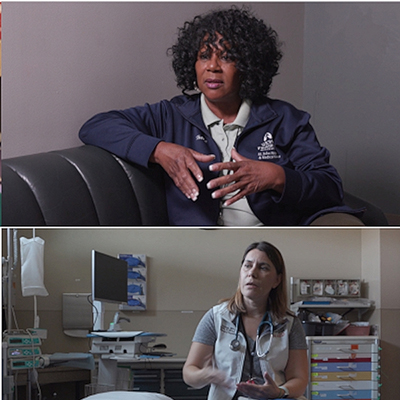Koren Thomas
In the middle of Emergency Nurses Week (October 11-17), a new feature-length documentary on emergency nurses is premiering on October 14. Viewers can see 16 ED nurses coping with everything from COVID-19 to gun violence, opioid overdoses, and the plight of uninsured patients in “In Case of Emergency,” which was directed by Carolyn Jones with the support of the Emergency Nurses Association (ENA). The locations include Iowa, Kentucky, Michigan, New Jersey, Oregon, Texas, and Vermont.
ENA President Mike Hastings, MSN, RN, CEN. said of the new film, “Emergency nurses experience things on a regular basis that most people will never see, things that most of the general public would not be able to tolerate, yet ED nurses face it all with poise, professionalism and an amazing human touch. This documentary will show our communities some of the challenges that we face day to day, COVID-19 or not, and provide some insight into our care settings. Most importantly, the film gives the public a true look at what essential heroes look like.”
Sheryl Hurst, RN, Ascension St. John Hospital, Detroit, MI: a community advocate who is trying to counter gun violence through education. “The violence has to be interrupted,” she says.
Angela Garrido, RN, St. Joseph’s University Medical Center Paterson, NJ Emergency Nurse: Garrido talks about her own battle with COVID-19. Hers was a relatively mild case, but “The simple task of taking a shower was exhausting; I’d have to sleep for three hours afterward,” she recalls.
Louis Cortes, RN, St. Joseph’s University Medical Center, Paterson, NJ Emergency Nurse: Cortes says that at the height of the New Jersey outbreak “We had brand-new nurses, straight out of school taking care of critical (Covid) patients from day one.”
Nancy Pitcock, RN, Texas Health Presbyterian Dallas, Dallas, TX, Emergency Nurse: the Dallas SANE relates: “There was one group of patients I felt had been really disserviced in the emergency room, and that was patients traumatized through sexual assault.” She notes that being treated by a SANE “not only helps with the healing of the patient, but also with identifying their needs immediately… and ultimately—hopefully—providing expert courtroom testimony.”
Lauren Habel, MSN, RN, CEN, TCRN, CFRN, St. Charles Health System, Madras, OR, Emergency Nurse: Habel discusses after-care for disadvantaged patients. If a patient agrees, “The community paramedic will actually go to their house and follow up on… helping them manage their meds, or with their new diagnosis of diabetes…. So that’s been a really cool program to get the health literacy up in the community.”
Jennifer Hanks, RN, UnityPoint Health – Finley Hospital, Dubuque, IA, Emergency Nurse: Hanks reflects on the importance of empathy and sympathetic communication in nursing: “When you can talk to them and explain what’s going on, that’s the human component that really makes all the difference.”
Special previews of the film will be available at the virtual conventions of the Emergency Nurses Association (ENA) and the American Nurses Credentialing Center (ANCC). For more details on the film, click here.
